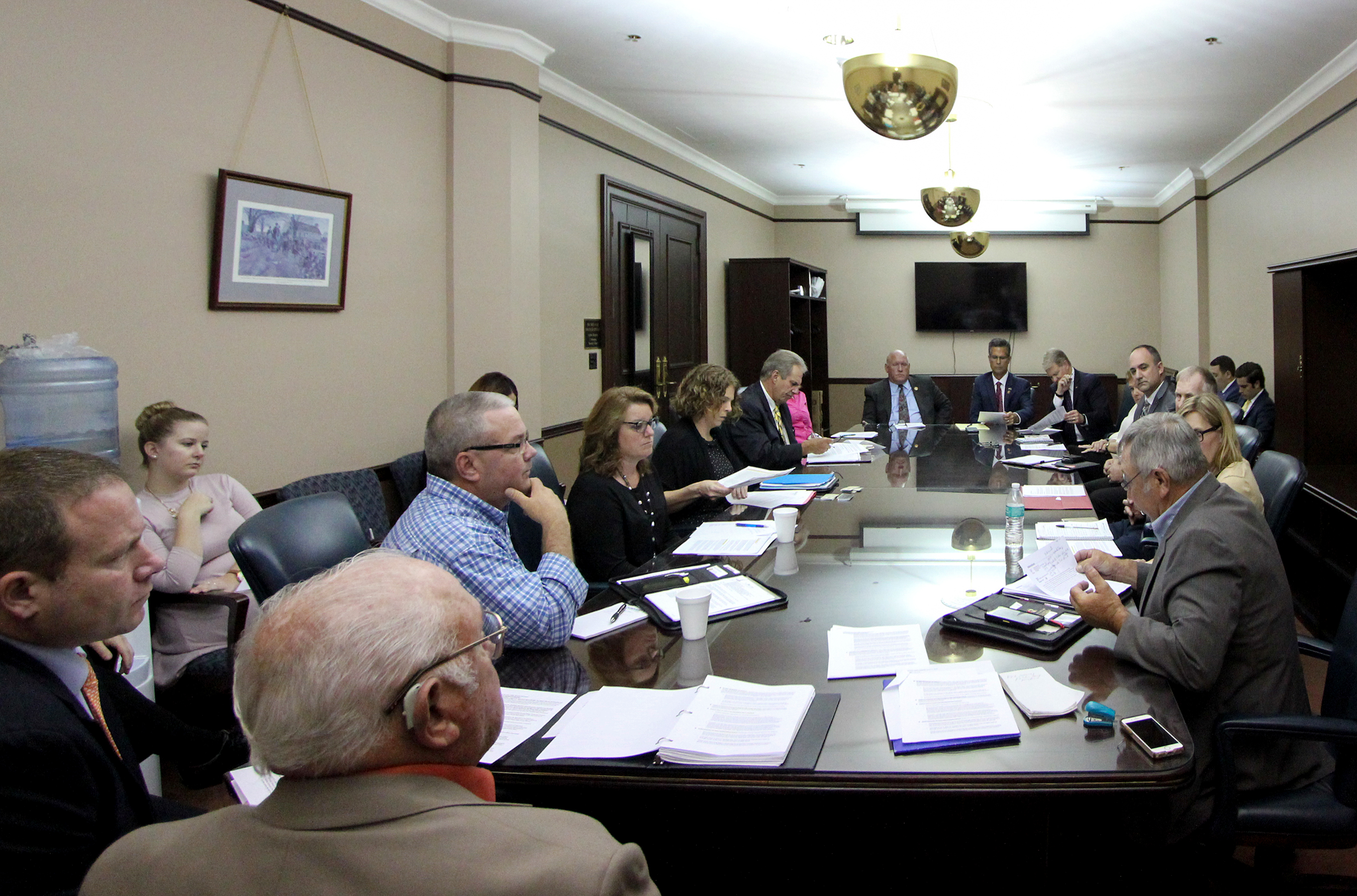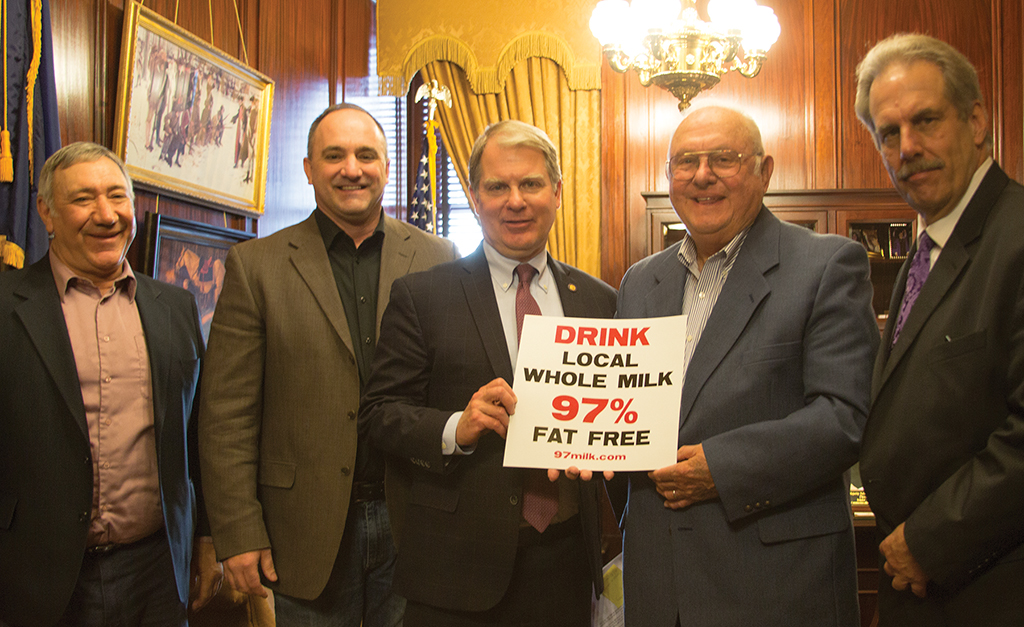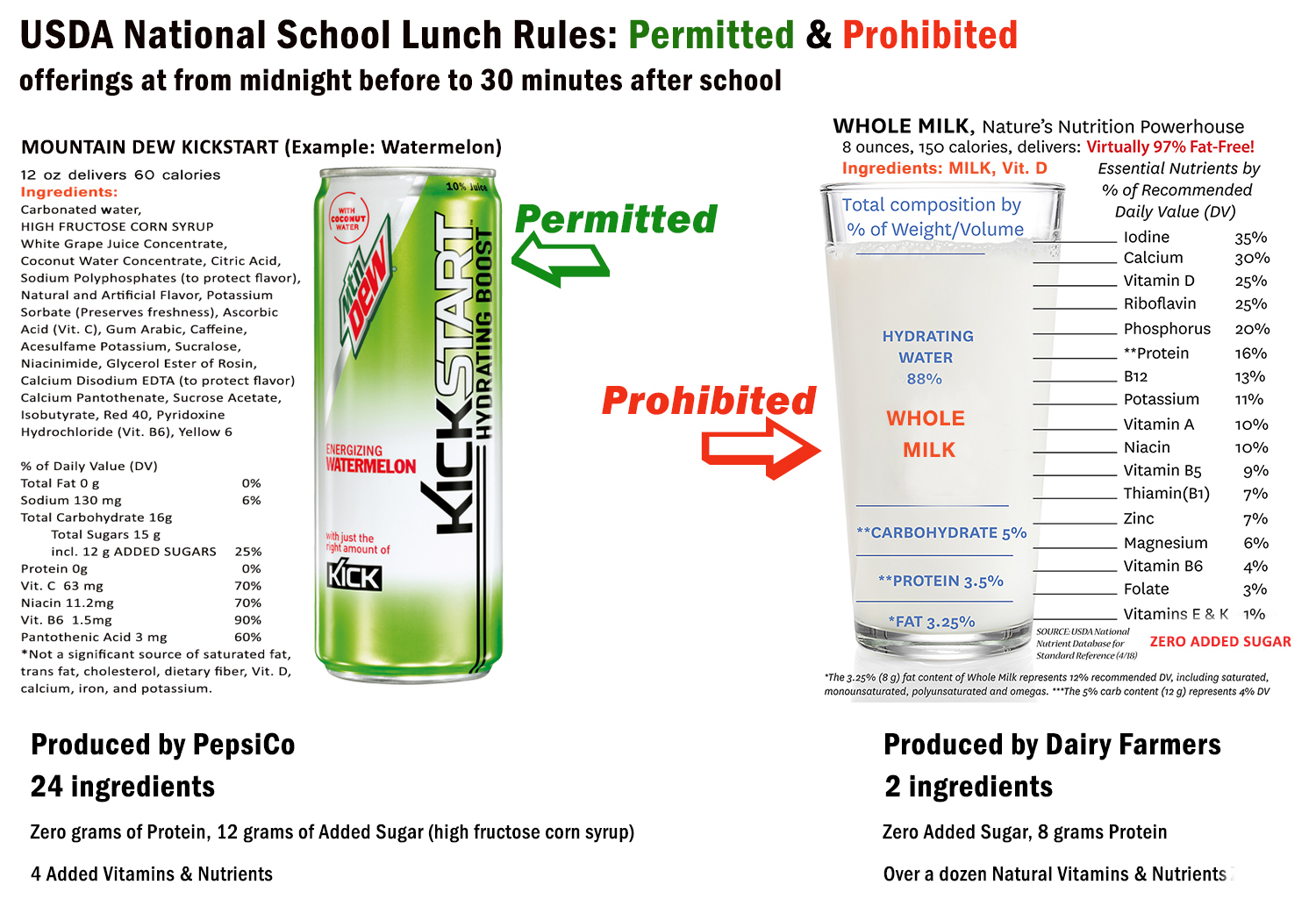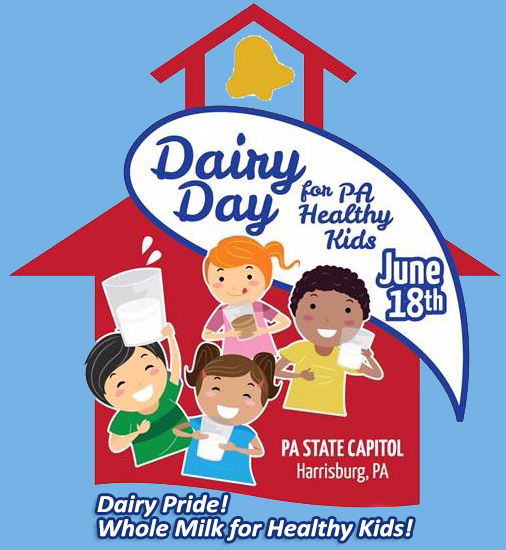Dairy Advisory Committee formed, meets with federal, state lawmakers

By Sherry Bunting, Farmshine, June 14, 2019
HARRISBURG, Pa. — “What I’m hearing here is that the government is between you and the consumer. You would have no problem marketing milk if you could get your message and product to the people,” said U.S. Congressman G.T. Thompson, representing Pennsylvania’s 15th legislative district over a swath of central and northcentral and northwest Pennsylvania.
That summed up the concerns related to school milk, dairy checkoff, fake milk labeling and other issues during a meeting between 11 dairy stakeholders and a dozen state and federal lawmakers and staff in Harrisburg on June 3.
It was a listening session that was followed by a productive work session as the grassroots group will continue to meet and correspond as a Dairy Advisory Committee.

Retired agribusinessman Bernie Morrissey and 97 Milk Baleboard initiator Nelson Troutman worked with Pa. State Senator David Argall of Berks and Schuykill counties to set up the meeting.
They pulled together an advisory committee of 11 people, including Troutman and Morrissey, along with Dale Hoffman and his daughter Tricia Adams of Hoffman Farms, Potter County; Mike Eby, a Lancaster County farmer and president of National Dairy Producers Organization; Lolly Lesher of Way-Har Farms, Berks County; Katie Sattazahn of Zahncroft Farms, Womelsdorf; Krista Byler, foodservice director for Union City School District in Crawford and Erie counties, whose husband operates a crop and dairy farm in Spartansburg; Bonnie Wenger of Wen-Crest Farms, doing custom cropping and heifer raising for dairies in Lebanon and Berks counties; and Karl Sensenig of Sensenig Feed Mill, New Holland.
I was privileged to moderate the discussion, for which an outline was provided in advance.
Congressman Thompson was joined by Congressman Dan Meuser, who represents Pennsylvania’s 9th district covering Carbon, Columbia, Lebanon, Montour and Schuykill counties along with portions of Berks, Luzerne and Northumberland.
In addition to State Senator David Argall, State Senator Scott Martin of Lancaster County attended, as ded legislative aids for Senators Ryan Aument, Elder Vogel, and Mike Folmer with additional interest from State Representatives John Lawrence and David Zimmerman.
Lawmakers said they left the discussion with “more work to do” and an “elevated awareness.” Their message to dairy farmers was: “Keep it up. Keep doing what you’re doing (a nod to the 97 Milk campaign and the planned rally for the Whole Milk for Healthy Kids Act on June 18 at the state Capitol). They said raising public awareness is crucial.
“Every few days, the bill gets another cosponsor,” said Rep. Thompson of HR 832 introduced in late January. “It will take public support and momentum to reverse this. It’s a challenging task.”
Even with evidence that bad science led to the federal school lunch milkfat restrictions, Thompson said the House Committee on Education and Labor must take up the bill in order for it to move forward. He noted that current leadership of that committee is the same as in 2010 when The Healthy Hunger Free Kids Act tightened the vice grip on milk fat. (Learn more about the school lunch changes over the past 10 to 20 years here.)
The 2010 legislation with the blessing of former Ag Secretary Tom Vilsack not only prohibited whole milk in the National School Lunch Program, it also reduced total calories, required less than 10% calories from saturated fat and made the milk part of the meal’s nutrient analysis.
With a nod to Krista Byler, Thompson said he understands more is needed beyond HR 832. “We need to eliminate the beverage information from the nutrient standards limitations,” said Thompson.
Discussion followed about the current Childhood Nutrition Reauthorization process currently underway in the Senate and what opportunities might exist for a regulatory change there.
Byler noted that while every child gets a milk, many students throw the milk away and buy sugary drinks that don’t offer milk’s nutrition.

Legislators were surprised to learn that high school students can’t buy whole milk but they can buy Mountain Dew Kickstart at school. This 80-calorie beverage made by PepsiCo — the company that also created a Smart Snacks website for school foodservice directors and received the GENYOUth Vanguard Award last November — is deemed “okay” by the current USDA Dietary Guidelines because it has fewer calories than milk, zero fat and a list of added, not natural, vitamins and minerals. But it also has 20 grams of carbohydrate, 19 grams of sugar in the form of high fructose corn syrup and zero protein, whereas whole milk has 12 grams of natural carbohydrate and 8 grams of protein.
In addition to Mountain Dew Kickstart, students in high schools and middle schools across the U.S. can buy other sweetened drinks like PepsiCo’s Gatorade as well as iced tea coolers. In addition, high schools are also permitted to have coffee bars.
Yet schools are prohibited from offering whole milk (3.25% fat) or reduced-fat (2%) with its high-quality protein and long list of natural nutrients – unless a child has a medical note from a physician.
On the flip side, schools must provide non-dairy substitutes like soy and almond beverage if a parent, not a physician, writes a note. And no notes are needed for students to throw away the milk and grab a sweetened high-carb beverage from PepsiCo.
“My purpose in coming here, after speaking with other foodservice directors across the state, is the changes that were made to allow 1% flavored milk last spring are having disheartening results. Schools have been doing the fat-free flavored milk as a requirement for so long, they don’t all understand the new rule,” Byler explained.
Part of the issue, she said, is they have their cycle menus done far in advance, and the changes to the milk — even if whole milk were suddenly allowed — do not fit into the nutrient analysis of the meal.
Before 2010, the milk was not included in the nutrient analysis of the school lunch or breakfast.
“It’s a breath of fresh air to hear members of Congress talk about this,” said Byler. “This bill (HR 832) is amazing, but it doesn’t have legs to stand on without the regulatory change to exclude milk from the nutrient analysis of the meal. For schools to have this choice, this bill needs to pass, and the milk needs to be a standalone component of the meal, otherwise schools won’t be able to make it work.”
She said the same goes for the Smart Snacks program. An exception to regulations is needed so schools can offer whole milk, just as they can offer PepsiCo’s energy drinks.
At the federal level, Rep. Thompson said the Pennsylvania Congressional delegation is working on getting a companion bill for HR 832 in the U.S. Senate. (This actually did happene a day after this report was filed for press — Senators Pat Toomey (R-Pa.) and Ron Johnson (R-Wis.) introduced the Milk In Lunch for Kids (MILK) Act this week. Bill number and text have not yet been posted)
“The biggest thing we need is to generate enough public support,” said Thompson.
The Dairy Advisory Committee urged Pa. State Senators to support a resolution on the federal bills.
On The Dairy Pride Act, Thompson was more optimistic. He believes FDA is giving an indication that the public has been misled by competing alternative beverages that infer by the name “milk” to have the nutritional attributes of milk.
Tricia Adams spoke of the many school tours she conducts at Hoffman Farms in the spring and summer, and what the kids tell them about school milk.
She says the kids are “brutally honest. They tell us, ‘This is the good milk!’ But just to get whole milk for a tour, I have to special order weeks in advance,” she says. “It’s a struggle to get enough of it at one time. It’s just not available.”
Her father Dale Hoffman observed that farmers are so busy, it’s tough to be involved in these things. He said it is scary how fast Pennsylvania is dropping in cow numbers and production.
“Somewhere, we need to get our foot in the door. This has got to be done if Pennsylvania is going to compete. We have the milk and the consumers right here,” said Hoffman. “We need your help. We hear it’s tough to get done, but it’s time to get whole milk back in the schools.”
Mike Eby said he sold his cows three years ago, but producers selling today “are getting half of what I got.” He said the dairy situation is increasingly difficult for farm families to manage whether they are staying in, or getting out, as the value of their assets shrink along with income.
“Where is our milk going to be coming from when we all go out?” he asked.
Eby describe the power of whole milk. He has been part of an effort to give out whole milk that is standardized to 3.5% fat instead of 3.25% to meet the California standards.
“We give the milk away at four parades a year,” he said, and the math adds up to over 10,000 individual servings. “We could give more! They love it. People are screaming for that milk.”
Circling back to Rep. Thompson’s point. The problem isn’t the product, the problem is the government getting between the farmer and the consumer when it comes to marketing the high value, nutritious and delicious product they produce.
State issues were also discussed, including needed reforms to the Pennsylvania Milk Marketing Law. Each participant also gave a fast view of the long dairy situation.
“The average dairy farmer we serve is under 150 cows, and our feed mill has 107 years in the business. We’ve seen a lot, but nothing as bad as this,” said Karl Sensenig. “We are greatly concerned about what is the future for the generations to come in our business and on the farms. We have become their bank. The situation is beyond dire, and I’m afraid we haven’t begun to see the true loss of farms. Even if the price gets a little better, many are so far gone that there’s no way out.”
Katie Sattazahn also questioned the future. She is integral to the farm operated by her husband and his brother, and she works off the farm. They upgraded their facility three years ago, never expecting a downturn of this duration and magnitude.
“The biggest thing is, we are supposed to be glad when we have a breakeven year, but that has to change. As dairy farmers, we need to be profitable to put something back into our operations,” she said. “Every dollar we spend is spent locally. Our farms provide open space and benefits for the environment, and the money we spend in our business helps the economy.”
With two young children, Sattazahn says, “If it stays the way it is, why would we encourage them to do this?”
Bonnie Wenger explained the conditions she sees in the community of dairy farmers. She explained to lawmakers the added difficulty of this year’s prevented plantings, a struggle that will get worse this fall in terms of feeding cows.
Byler also talked about the dire situation in her county. “The dairy farms support our communities. They support other businesses and bring in revenues for our school districts,” she said. “What will be left for our small rural communities?”
On the school front, she showed examples of the marketing foodservice directors see, pushing them away from animal protein. This included visuals from Fuel Up To Play 60 and its focus on fat-free and low-fat. She wonders why they can’t just talk about milk, why they have to pound home the fat-free, low-fat with every caption, every sentence, over and over. She has trouble seeing the value in it from the side of the dairy farmer or the school program.
Lawmakers and staff were taking notes, writing in the margins and circling things on the outline provided. By the end of the session, Sen. Argall said, “You’ve created a lot of work for us.”
Congressman Meuser noted this is now an even higher priority for him.
Sen. Martin said this is on the Pennsylvania Assembly’s radar, and he mentioned a package of bills coming that are “just a start.” He mentioned the dairy commission being put together to advise the legislature on dairy.
They reminded the group to urge others to attend the rally on June 18 at 11:00 a.m. at the Capitol Rotunda in Harrisburg to support the federal dairy bills on whole milk in schools and mislabeling of non-dairy beverages. The media will be there, and this is a chance to get the public involvement that is necessary.
Here is another link to 8 ways you can help. (Swipe to read second page of this pdf).

-30-

A heartfelt thank you to all involved here, you have your finger on the pulse of the situation of us dairy farmers, the last few years has turned our direction and future plans 180°. It is now just a struggle to survive another year with no real hope to continue further down the road to pass on the family business and legacy, so sad and totally discouraging. I really appreciate whatever you can do to help with the situation.
Ron Learn, Indiana County Dairy Farmer
LikeLike
Very informative piece.
LikeLiked by 1 person
Very informative piece.
LikeLike
Thank you
LikeLike
Pingback: Federal prohibition of whole milk in schools challenged in PA Senate committee hearing | Ag Moos